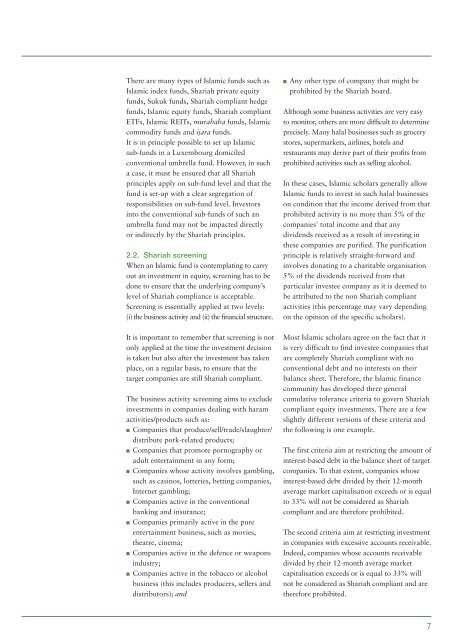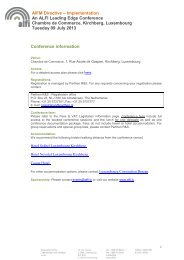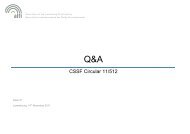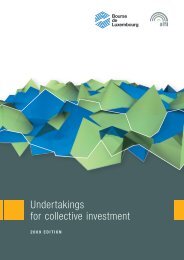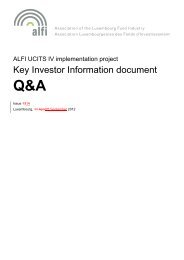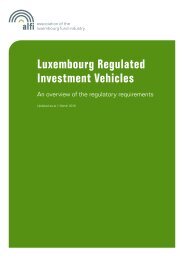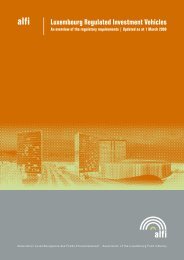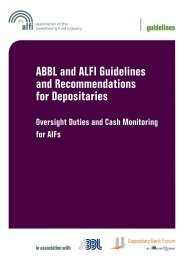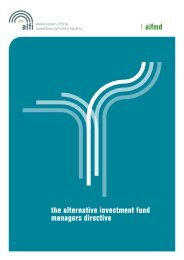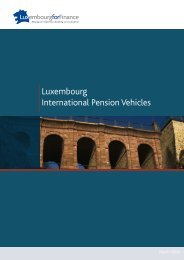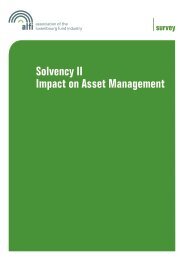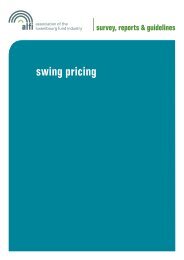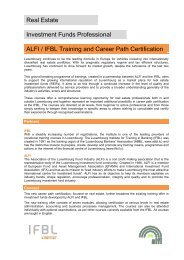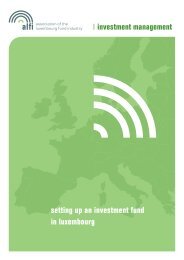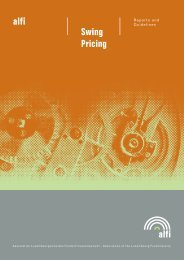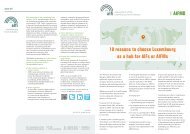Islamic Funds - Collection of best practices for setting-up and ... - Alfi
Islamic Funds - Collection of best practices for setting-up and ... - Alfi
Islamic Funds - Collection of best practices for setting-up and ... - Alfi
You also want an ePaper? Increase the reach of your titles
YUMPU automatically turns print PDFs into web optimized ePapers that Google loves.
There are many types <strong>of</strong> <strong>Islamic</strong> funds such as<br />
<strong>Islamic</strong> index funds, Shariah private equity<br />
funds, Sukuk funds, Shariah compliant hedge<br />
funds, <strong>Islamic</strong> equity funds, Shariah compliant<br />
ETFs, <strong>Islamic</strong> REITs, murabaha funds, <strong>Islamic</strong><br />
commodity funds <strong>and</strong> ijara funds.<br />
It is in principle possible to set <strong>up</strong> <strong>Islamic</strong><br />
sub-funds in a Luxembourg domiciled<br />
conventional umbrella fund. However, in such<br />
a case, it must be ensured that all Shariah<br />
principles apply on sub-fund level <strong>and</strong> that the<br />
fund is set-<strong>up</strong> with a clear segregation <strong>of</strong><br />
responsibilities on sub-fund level. Investors<br />
into the conventional sub-funds <strong>of</strong> such an<br />
umbrella fund may not be impacted directly<br />
or indirectly by the Shariah principles.<br />
2.2. Shariah screening<br />
When an <strong>Islamic</strong> fund is contemplating to carry<br />
out an investment in equity, screening has to be<br />
done to ensure that the underlying company’s<br />
level <strong>of</strong> Shariah compliance is acceptable.<br />
Screening is essentially applied at two levels:<br />
(i) the business activity <strong>and</strong> (ii) the financial structure.<br />
QQ<br />
Any other type <strong>of</strong> company that might be<br />
prohibited by the Shariah board.<br />
Although some business activities are very easy<br />
to monitor, others are more difficult to determine<br />
precisely. Many halal businesses such as grocery<br />
stores, s<strong>up</strong>ermarkets, airlines, hotels <strong>and</strong><br />
restaurants may derive part <strong>of</strong> their pr<strong>of</strong>its from<br />
prohibited activities such as selling alcohol.<br />
In these cases, <strong>Islamic</strong> scholars generally allow<br />
<strong>Islamic</strong> funds to invest in such halal businesses<br />
on condition that the income derived from that<br />
prohibited activity is no more than 5% <strong>of</strong> the<br />
companies' total income <strong>and</strong> that any<br />
dividends received as a result <strong>of</strong> investing in<br />
these companies are purified. The purification<br />
principle is relatively straight-<strong>for</strong>ward <strong>and</strong><br />
involves donating to a charitable organisation<br />
5% <strong>of</strong> the dividends received from that<br />
particular investee company as it is deemed to<br />
be attributed to the non Shariah compliant<br />
activities (this percentage may vary depending<br />
on the opinion <strong>of</strong> the specific scholars).<br />
It is important to remember that screening is not<br />
only applied at the time the investment decision<br />
is taken but also after the investment has taken<br />
place, on a regular basis, to ensure that the<br />
target companies are still Shariah compliant.<br />
The business activity screening aims to exclude<br />
investments in companies dealing with haram<br />
activities/products such as:<br />
QQ<br />
Companies that produce/sell/trade/slaughter/<br />
distribute pork-related products;<br />
QQ<br />
Companies that promote pornography or<br />
adult entertainment in any <strong>for</strong>m;<br />
QQ<br />
Companies whose activity involves gambling,<br />
such as casinos, lotteries, betting companies,<br />
Internet gambling;<br />
QQ<br />
Companies active in the conventional<br />
banking <strong>and</strong> insurance;<br />
QQ<br />
Companies primarily active in the pure<br />
entertainment business, such as movies,<br />
theatre, cinema;<br />
QQ<br />
Companies active in the defence or weapons<br />
industry;<br />
QQ<br />
Companies active in the tobacco or alcohol<br />
business (this includes producers, sellers <strong>and</strong><br />
distributors); <strong>and</strong><br />
Most <strong>Islamic</strong> scholars agree on the fact that it<br />
is very difficult to find investee companies that<br />
are completely Shariah compliant with no<br />
conventional debt <strong>and</strong> no interests on their<br />
balance sheet. There<strong>for</strong>e, the <strong>Islamic</strong> finance<br />
community has developed three general<br />
cumulative tolerance criteria to govern Shariah<br />
compliant equity investments. There are a few<br />
slightly different versions <strong>of</strong> these criteria <strong>and</strong><br />
the following is one example.<br />
The first criteria aim at restricting the amount <strong>of</strong><br />
interest-based debt in the balance sheet <strong>of</strong> target<br />
companies. To that extent, companies whose<br />
interest-based debt divided by their 12-month<br />
average market capitalisation exceeds or is equal<br />
to 33% will not be considered as Shariah<br />
compliant <strong>and</strong> are there<strong>for</strong>e prohibited.<br />
The second criteria aim at restricting investment<br />
in companies with excessive accounts receivable.<br />
Indeed, companies whose accounts receivable<br />
divided by their 12-month average market<br />
capitalisation exceeds or is equal to 33% will<br />
not be considered as Shariah compliant <strong>and</strong> are<br />
there<strong>for</strong>e prohibited.<br />
7


